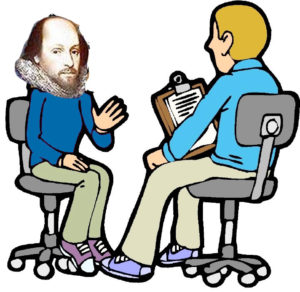 If William Shakespeare applied for a job in a corporation today, would he get it? Or would he be rejected for being unable to speak the fuzzy and sometimes nebulous managerese?
If William Shakespeare applied for a job in a corporation today, would he get it? Or would he be rejected for being unable to speak the fuzzy and sometimes nebulous managerese?
The question must remain unanswered but let’s imagine that the ghost and spirit of Shakespeare enter into your soul, so that you can fit Shakespearean language to situations you encounter or questions you are asked.
In this session you are applying for a job. (HR) refers to a Human Resources Representative, the initials WS are self-explanatory.
On being called in for an interview.
HR. How are you?
WS. Like to the time of the year between the extremes of hot and cold – neither sad, nor happy. (Antony and Cleopatra)
HR Do you feel comfortable?
WS. “I am distilled to jelly by the act of fear.” (Hamlet) Use caution, the interviewer may think you are serious.
HR. Do you consider yourself a doer or a doubter?
WS. Doubting things go ill, often hurts more than to be sure they do. For certainties either are past remedy, or timely knowing, a remedy is born. (Cymbeline)
Actually, you may want to study the demeanor of the interviewer. If you sense that he/she is not too keen on people who are always very sure of themselves, you may add,
WS. “… on the other hand, “modest doubt is call’d the beacon of the wise.” (Troilus and Cressida)
HR. Why do you want to work?
WS. “…What is a man,
If his chief good and market of his time
Be but to sleep and feed? a beast, no more. “ Hamlet
Your resume shows some unexplained gaps in employment.
HR. I see that you have not worked from date x to date y. Why?
WS. “Our wills and fates do so contrary run
That our devices still are overthrown;
Our thoughts are ours, their ends none of our own.” (Hamlet)
…then proceed with whatever explanation you may have on the issue.
HR Are you a reliable person? Or other oblique words to that effect.
WS. “I am as constant as the northern star,
Of whose true fixed and resting quality
There is no fellow in the firmament.” (Julius Caesar)
HR. Do you like people?
WS. “I love all, trust a few, do wrong to none.” (All’s Well That Ends Well)
HR How do you react to criticism?
WS. “I take each man’s censure, but reserve my judgment.” (Hamlet)
HR. How do you deal with an angry customer?
WS. My first reaction is to say, “Upon the heat and flame of your distemper, sprinkle cool patience?” (Hamlet)
HR. How do you feel about people who have a very hard time to understand even simple concepts?
WS. “… he that hath learned no wit by nature nor art, may complain of good breeding or comes of a very dull kindred.” (As You Like It)
HR How are your verbal communications?
WS “I suit the action to the word, the
word to the action” (Hamlet)
HR What can you do for us?
WS “I dare do all that becomes a man” (Macbeth)
HR Do you consider yourself an optimist or a pessimist?
WS. It depends. “The man that once did sell the lion’s skin
While the beast liv’d, was kill’d with hunting him.” (King Henry V)
If the interviewer does not give you any indication as to your compensation.
WS. “ I will be a fool in question, hoping to be the wiser by your answer. “ then proceed cautiously to explore the issue. Remember that you are supposed not to be interested in compensation. Which of course is not true. But as Hamlet said to Queen Gertrude, “Assume a virtue, if you have it not.”
HR What do you think of Hillary Clinton?
WS The lady doth protest too much, methinks. (Hamlet)
HR What do you think of George W. Bush, Cheney etc.?
WS. “They are not worth the dust, that the rude wind blows in my face.” (King Lear)
HR Are you a communist?
WS “…clay and clay differs in dignity,
Whose dust is both alike.” (Cymbeline)
Though we can never be conclusive on matters of physiognomy, it is reasonably easy to detect (from facial countenance, body language and demeanor), if you are facing a neo-christian fundamentalist or a softer member of the bourgeosie.
I am afraid that even if you just nurture ideas that would define you a socialist, you must do your utmost to keep them buried. After 35 years of Reaganesque propaganda and indoctrination, a socialist fares as well as a convict in the perception of the “blunt monster with the uncounted heads.”
On the other hand, this Shakesperean answer is not a justification for neo-liberal capitalism in its most grotesque actual forms. Rather, it is a recognition of the individual differences that, for good or for bad, are one of the positive things about the race of the so-called humans.
The interview is getting to the end and you want to ask what next.
WS. “When shall we two meet again?
In thunder, lightning or in rain?” (Macbeth)
Again, caution, especially if the interviewer is a female. Or she may suspect you think she is a witch.
End of First Session
Image Source:
http://www.google.com/url?sa=i&rct=j&q=&esrc=s&source=images&cd=&cad=rja&docid=_3jITYAy81dFUM&tbnid=embNblkbUPy_7M:&ved=0CAUQjRw&url=http%3A%2F%2Fwww.caitlinhanzlick.com%2Flesson_interview.html&ei=YSD3UvaSK4eFogSfjYGoDg&bvm=bv.60983673,d.cGU&psig=AFQjCNFVjcJHfnQmfjs3FD1YsR2hykiwPg&ust=1392013791428024
